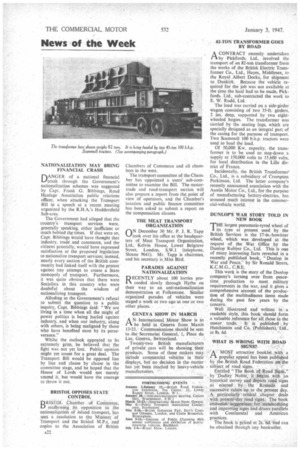News of the Week
Page 24

If you've noticed an error in this article please click here to report it so we can fix it.
NATIONALIZATION MAY BRING FINANCIAL CRASH
DANGER of a national financial crash through the Government's nationalization schemes was suggested by Capt. Frank G. Ribbings, Road Haulage Association public relations officer, when attacking the Transport Bill in a speech at a recent meeting organized by the R.H.A.'s Huddersfield Sub-a rea .
The Government had alleged that the country's transport services were, generally speaking, either inefficient or much behind the times. If that were so, Capt. Bibbings would have thought that industry, trade and commerce, and the citizens generally, would have expressed satisfaction at the proposed legislation to nationalize transport services; instead, nearly every section of the British community had linked itself with the protest against any attempt to create a State monopoly of transport. Furthermore, it was quite obvious that there were Socialists in this country who were doubtful about the wisdom of nationalizing transport.
Alluding to the Government's refusal to submit the question to a public inquiry, Capt. Bibbings iaid: "We are living in a time when all the might of power politics is being hurled against industry, and when our industry, along with others, is being maligned by those who have benefited most by its perseverance."
Whilst the outlook appeared to be extremely grim, he believed that the fight was not yet lost. Public opinion might yet count for a great deal. The Transport Bill would be opposed line by line and clause by clause in the committee stage, and he hoped that the House of Lords would not merely amend it. but 'would have the courage to throw it out.
• BRISTOL OPPOSES STATE CONTROL
D RISTOL chamber of Commerce,
reaffirrninA its opposition to the nationalkation of inland transport, has sent a resolution to the Minister of Transport and the Bristol M.P.s, and copies to the Association of British Chambers of Commerce and all chambers in the west.
The transport committee of the Chamber has appointed a users' sub-committee to examine the Bill. The motortrade and road-transport section will also prepare a report from the point of view of operators, and the Chamber's taxation and public finance committee has been asked to submit a report on the compensation clauses.
THE MEAT TRANSPORT ORGANIZATION
ON December 30 Mr. P. J. R. Tapp took over his office at the headquarters of Meat Transport Organization, Ltd., Kelvin House, Lower Belgrave Street, London, S.W.1 (telephone, Sloane 9641). Mr. Tapp is chairman, and his secretary is Miss Bird.
PARADES AGAINST NATIONALIZATION
RECENTLY about 100 lorries proceeded slowly through Hythe on their way to an anti-nationalization demonstration at Folkestone. Similar organized parades of vehicles were staged a week or two ago at one Or two other places.
GENEVA SHOW IN MARCH
AN International Motor Show is to be held in Geneva from March 13-23. Communications should be sent to the Secretariat General, 1, Place du Lac, Geneva, Switzerland.
Twenty-two British manufacturers of private cars will be showing their products. Some of these makers may include commercial vehicles in their displays, but no decision in the matter has yet been reached by heavy-vehicle manufacturers. 82-TON TRANSFORMER GOES BY ROAD
ACONTRACT recently undertaken by Pickfords, Ltd., involved the transport of an 82-ton transformer from the works of the British Electric Transformer Co., Ltd., Hayes, Middlesex, to the Royal Albert Docks, for shipment to Dunkirk. Because the vehicle required for the job was not available at the time the haul had to be made, Pickfords. Ltd. sub-contracted the work' to E. W. Rudd, Ltd.
The load was carried on a side-girder wagon consisting of two 35-ft. girders. 2 ins, deep, supported by two eightwheeled bogies. The transformer was carried by the seating lugs, which are specially designed as an integral part of the casing for the purpose of transport. Two Scammell 100 b.h.p. tractors were used to haul the load.
Of 50,000 Kw. capacity, the transformer is to be used to step-down a supply at 150,000 volts to 15,600 volts, for local distribution in the Lille district of France.
Incidentally, the British Transformer Co., Ltd., is a subsidiary of Crompton Parkinson, Ltd. The latter company's recently announced association with the Austin Motor Co., Ltd., for the purpose of manufacturing battery-electrics, has aroused much interest in the commercial-vehicle world.
DUNLOP'S WAR STORY TOLD IN NEW ROOK
THE largest pneumatic-tyred wheel of its type at present used by the British Services is the 17-in.-howitzer wheel, which was developed at the request of the War Office by the Dunlop Rubher Co.. Ltd. This is one of many interesting facts revealed in a recently published book, "Dunlop in War and Peace," by Sir Ronald Storrs, K.C.M.G., C.B.E.
This work is the story of the Dunlop company's turning over from peacetime production to meet military requirements in the war, and it gives a comprehensive account of the production of the multitudinous items made during the past few years by the concern.
Well illustrated and written in a readable style, this book should form a valuable reference for all those in the motor trade. It is published by Hutchinson and Co. (Publishers), Ltd.,
at 8s. 6d.
WHAT IS WRONG WITH ROAD SIGNS?
AMOST attractive booklet with et popular appeal has been published by the British Road Federation OR the subject of road signs.
Entitled "The Book of Road Signs," by Dudley Noble, it begins with an historical survey and depicts road signs as erected by the Romani and successive rulers up to the present day. A particularly critical chapter deals with present-day road signs. The book embodies suggeations for standardizing and improving signs and draws parallels with Continental and American practices.
The book is priced 'at 2s. 6d. and can be obtained through any bookseller.




































































